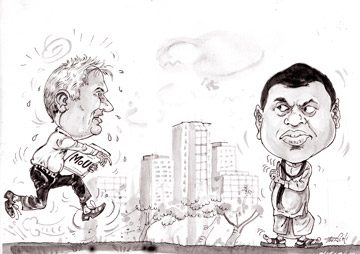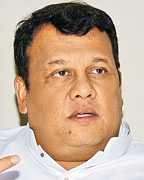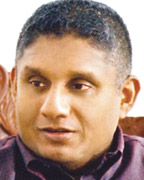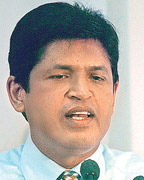Basil’s response to Ranil’s MoU suggestion
 Opposition Leader Ranil Wickremesinghe last week came out with his
latest strategy to overcome problems within his United National Party
(UNP) and remain as the UNP leader until his death! Opposition Leader Ranil Wickremesinghe last week came out with his
latest strategy to overcome problems within his United National Party
(UNP) and remain as the UNP leader until his death!
He suggested that the UNP is ready to sign a Memorandum of
Understanding (MoU) with the Government so that he could go all the way
to Geneva to speak on behalf of Sri Lanka at the ongoing United Nations
Human Rights Council (UNHRC) sessions.
He said he would even come to Mattala, where the country’s second
international airport will be opened by President Mahinda Rajapaksa
tomorrow, to sign the MoU with the Government.
Even a child would know the hard time the UNP leader is undergoing,
losing over 25 successive elections including three general elections
and two presidential elections under his shaky leadership.
 Moreover, Sajith Premadasa is roaring to oust the leader and find the
winning formula for the UNP. Many believe that Wickremesinghe is more
than happy with the post of Opposition Leader he holds now and is
acutely aware of his capabilities and limitations. Moreover, Sajith Premadasa is roaring to oust the leader and find the
winning formula for the UNP. Many believe that Wickremesinghe is more
than happy with the post of Opposition Leader he holds now and is
acutely aware of his capabilities and limitations.
However, he needs a new slogan and a story to woo the moderate UNPers
and silence the reformists within his party.
Hence, he came up with an overnight suggestion of a MoU at a time
none of the UNP or Government politicians asked for such an alliance.
 |
| Mahinda
Samarasinghe |
 |
| Pavithra
Wanniarachchi |
 |
| Sajith
Premadasa |
 |
| W.B. Ganegala |
On the other hand, the ruling UPFA commands more than two-thirds
majority in Parliament and does not need the support of bankrupt
political parties such as the UNP and JVP.
But Wickremesinghe unilaterally suggested signing of a MoU, assuming
that it would help him to resurrect his image and that of the political
party he leads.
But he never thought that it would boomerang on him as he has
demanded signing of a MoU to voice his support on behalf his motherland.
If he is genuinely interested in supporting Sri Lanka at the UNHRC, he
could do so without any conditions or MoUs.
Sri Lanka Freedom Party (SLFP) National Organiser, Minister Basil
Rajapaksa rejected Wickremesinghe’s offer to sign a MoU with the
Government. The Minister said that the UNP leader has no moral right to
suggest a MoU and speak on behalf of the country at the UNHRC sessions.
Speaking at the opening of Reggie Ranatunga Vidyalaya in Minuwangoda,
Minister Rajapaksa said there were hundreds of thousands of people who
were prepared to go to Geneva and speak on behalf of the President
without signing any MoUs.
The Minister said the President had come forward to save the country
from the clutches of LTTE terrorism paying no heed to external threats.
“He came forward to save the country and told the people he would
save the country from terrorism even if it resulted in him being sent to
the electric chair. Despite what he has done several external elements
have continued to discredit the president and the country,” he said.
Anunayaka takes Ranil to task
Opposition Leader and UNP Chief Ranil Wickremesinghe kept away from
the ceremony at which the Akthapathra was presented to the Most Ven.
Napane Pemasiri Thera, Mahanayaka of the Sri Lanka Ramanna Maha Nikaya.
He feared that his shortcomings would be exposed, the Most Ven.
Girambe Ananda Thera, Anunayaka of the same Chapter, told a local
newspaper. The Ven. Thera said Wickremesinghe is not fit to be a future
leader of the country as he has emasculated the UNP and alienated its
loyal members.
Leaders of all political parities including Ranil Wickremesinghe had
been invited to the ceremony.
However, Ranil was later seen singing his cares away at a cricket
match between two schools , at a venue adjacent to the Independence
Square.
The match proved to be a source of disturbance to the ceremony
presided over by President Mahinda Rajapaksa. The rumpus continued
albeit.
The Thera said that Wickremesinghe has destroyed the UNP and
alienated its members and hence he was not fit to be the leader.
As long as he continues as Leader of the Opposition, he does not pose
any threat to the Presidency.
The President had provided him all facilities including renovations
to the office of the Opposition Leader, enhanced security, a substantial
financial provision for his office and a luxury vehicle, the Thera said.
Sajith back in WC
These unfavourable developments would have prompted Wickremesinghe to
take one step back and look more strategically on the Reformist group
which still operates within the UNP.
Though the UNP reformist do not issue statements as in the past, they
continue operate silently and are waiting for the right time to topple
the leader and gain control of the party.
Wickremesinghe would have felt that the situation is not too
conducive, though he has the backing of his Working Committee. Hence,
former UNP Deputy Leader Sajith Premadasa was re-appointed to the
Working Committee last week.
More importantly, Sajith has been appointed to the Working Committee
through the party leader’s quota.
He was a member of the Working Committee earlier in his capacity as
the Deputy Leader but once he lost the post, he automatically lost his
place in the Working Committee.
But Ranil’s latest move is merely to satisfy Sajith temporally. The
majority of the UNP Working Committee are Ranil loyalists appointed
directly by the party leader.
An isolated Sajith could do precious little in the Working Committee
and Ranil too knows it well.
Hence, Ranil would have thought it is better to re-accommodate Sajith
in the Working Committee under his quota of members and get credit.
“The party leader is able to name 20 members to the UNP Working
Committee as he sees fit while the appointing of Premadasa was done
under that authority,” UNP General Secretary Tissa Attnayake was quoted
as saying.
President’s visit to Japan
Leaders of Japan and Sri Lanka pledged to work towards strengthening
the partnership beyond the 60th anniversary of diplomatic relations
between the two countries.
President Rajapaksa, First Lady Shiranthi Rajapaksa and a high level
delegation flew to Japan on the invitation of Japanese Prime Minister
Shinzo Abe.
Both leaders decided to use wide ranging visits and dialogue to
further reinforce bilateral cooperation. Issuing a joint statement, they
expressed their satisfaction at the outcome of the official working
visit by President Rajapaksa which had provided further testimony to
continuing excellent relations between the two countries.
At this meeting, President Mahinda Rajapaksa extended a invitation to
Japanese Prime Minister Shinzo Abe to visit Sri Lanka to which the
Japanese Prime Minister expressed his appreciation.
At the Summit meeting which marked the mutual respect, understanding
and historical relations between the two countries since the San
Francisco Peace Conference in 1951, both leaders acknowledged the
relationship of the two countries have matured and diversified with the
passing of time, encompassing wide ranging areas of contemporary
relevance, including trade and investment, development cooperation,
culture and education.
President Rajapaksa appreciated Japan’s Official Development
Assistance (ODA) over the years which played a significant role in the
social and economic development of Sri Lanka.
President Rajapaksa also commended the ongoing study of the Japan
International Cooperation Agency (JICA) on transport infrastructure for
metropolitan area and expressed hope that Japan’s assistance would
continue in this area to introduce a suitable transport system to
mitigate traffic congestion and eliminate transport bottlenecks in the
Colombo Metropolitan area and the suburbs.
Prime Minister Abe expressed his profound gratitude on behalf of the
people of Japan for the heartfelt sympathy and support extended to them
from the Government and people of Sri Lanka, following the Great East
Japan Earthquake.
The two leaders also noted the need to cooperate in the field of
disaster management as countries that had suffered natural calamity.
The two leaders also agreed that as maritime countries, Japan and Sri
Lanka had a responsibility to play important roles for the stability and
prosperity of the Pacific and Indian Ocean regions.
Electricity subsidy for three million families
The Government was compelled to revise electricity tariffs for a
short period.
The electricity bills would be increased temporarily with a promise
to do away with the fuel surcharge from next year.
Though the Opposition was making a desperate attempt to capitalise on
this and mislead the public, the new Ceylon Electricity Board Chairman
W.B. Ganegala made an important disclosure on a staggering Rs. 26,000
million already given as electricity subsidy.
Although the government provides an electricity subsidy of Rs. 26,000
million for over three million families in the country, the government
has decided to provide electricity even to the most underprivileged
family in the country before long, though the decision greatly increases
the CEB’s expenditure, said CEB Chairman W.B. Ganegala.
The CEB Chairman said the government has decided to increase
electricity connections by 100 percent by the middle of next year. “This
will provide people in the urban and rural areas equal opportunities,
raising their living standards.” The CEB Chairman made these
observations at a discussion at the CEB.
Ganegala said over five million families have been provided with
electricity and three million families out of this number, use less than
90 units a month.
“An electricity subsidy of Rs. 26,000 million is granted to those
families using less than 90 units a month. The government has no
intention of removing the subsidy,” he said. He said the new tariff is
only to obtain the additional expenditure of the CEB due to the fuel
price hike.
Ganegala said there will not be any electricity tariff increase after
2013 and relief would be provided to consumers. He also said that in the
final stage of providing electricity to those in remote areas like
mountainous areas of Kotmale and Mahavilachchiya will be very costly.
He said that though families in such areas pay a sum of Rs. 200
monthly as a bill under concessionary rates, the CEB has to expend
billions of rupees to provide electricity to 50 such houses. Meanwhile,
Power and Energy Minister Pavitra Devi Wanniarachchi said that the CEB
would not purchase electricity from private sector run fuel powered
thermal power plants when the contracts lapse, as a measure of reducing
CEB electricity generation costs to provide relief to the consumers.
She said the CEB could stop buying electricity at higher prices from
the private sector due to the unwavering political decision taken by
President Mahinda Rajapaksa to set up coal power thermal plants that
generate a unit of electricity a very low cost.
She also said that the price of a unit of electricity generated by
the private sector is sometimes Rs. 40 per unit while a unit of coal
power electricity is around Rs. 7.50. The first phase of the
Norochcholai coal power plant is already commissioned and phase two and
three will be commissioned very soon.
The Minister made these observations during a discussion at the
Foundation Institute. CEB Additional Deputy General Manager D K B S
Thilakasena said the Kelanitissa Gas turbines which will be put out off
use by 2014 will help save a lot funds money on fuel.
Ace Power in Embilipitiya, Heladanavi and Colombo power will also be
phased out in 2015.
With the commission of the Broadlands, Uma Oya project and Ging Ganga
projects in 2015 and 6,750 MW coal power thermal plants from 2017 to
2019, the country will not face any electricity crisis and power would
be provided to CEB consumers at a comparatively low rate.
World support for Sri Lanka
Western nations are underestimating the development in Sri Lanka
since the end of terrorism, Japanese Deputy Prime Minister Taro Aso said
when he met President Rajapaksa during the Lankan leader’s four-day
official visit to Japan.“Sri Lanka’s security situation is getting
better. The economy is on the right track. Investors and tourists are
going to the country”, he said.
President Rajapaksa while thanking Japan for its assistance for Sri
Lanka’s development said that leaders and people of the world should
visit Sri Lanka to see for themselves the progress the country had
achieved in all aspects in recent times. Ambassador Yasushi Akashi also
met the President at a private lunch. During the visit President
Rajapaksa held discussions with Japanese Prime Minister Shinzo Abe and
had an audience with the Japanese Emperor and Empress who hosted a lunch
for the President and the First Lady at the Imperial palace.
Meanwhile, China called on the international community to respect the
sovereignty of Sri Lanka and provide assistance to rebuild the country.
Speaking at the 22nd session of the UNHRC during the debate on the UPR
of Sri Lanka, China also said that the international community should
avoid external interference into the internal matters of Sri Lanka.
Also speaking at the session Oman stated that Sri Lanka has shown the
willingness to corporate with the international community by accepting
the recommendations of the UPR. Oman recommended the council to adopt
the UPR report at the UNHRC.
Minister Samarasinghe back in Geneva
Minister Mahinda Samarasinghe is back in Geneva to attend the UNHRC
Sessions and UPR meetings. “Ground verification of facts is continuing
in the aftermath of results of a national census of 2012 - and the
enumeration in the North preceding it in 2011 which were of such
importance.
”We believe we will be able to gain an accurate picture of the
several causes of civilian deaths,” said Special Envoy of President on
Human Rights and Leader of the Delegation of Sri Lanka to the 22nd
Sessions of the UN Human Rights Council Geneva, on Friday.
“We have come a long way since the initial Universal Periodic Review
of Sri Lanka during the first cycle in 2008. My country then was engaged
in a conflict against terrorism, in commencing in 2006, in trying to
rescue a civilian population held by a ruthless group of terrorists.
”A year after that first review, we finally achieved success in the
humanitarian operation and witnessed the dawn of a new era of peace,
stability and prosperity for all Sri Lankans.
”Since May 2009 we engaged in a period of consolidation, removing
military involvement in civil administration, reconstruction, demining,
rehabilitation, resettlement and launched our initial efforts at
national reconciliation and peace-building,” he said.
“Further to the recommendation of the LLRC, the database on detainees
is available to next of kin (NoK) who are able to obtain details in
response to their inquiries. The investigations into those allegedly
disappeared are ongoing through national mechanisms.
“As we have regularly informed this Council, the National Plan of
Action for the Promotion and Protection of Human Rights (NHRAP), was a
commitment that grew out of our initial Review in 2008. That was a
principal pledge we made and one that we spent considerable time and
effort in realising. December 2012 marked the first year of
implementation of the NHRAP,” he said. Minister Samarasinghe reiterated
that Sri Lanka is deeply appreciative of Member and Observer States for
their interest and positive engagement during its UPR Process and their
acknowledgement of our efforts in the promotion and protection of human
rights.
|



